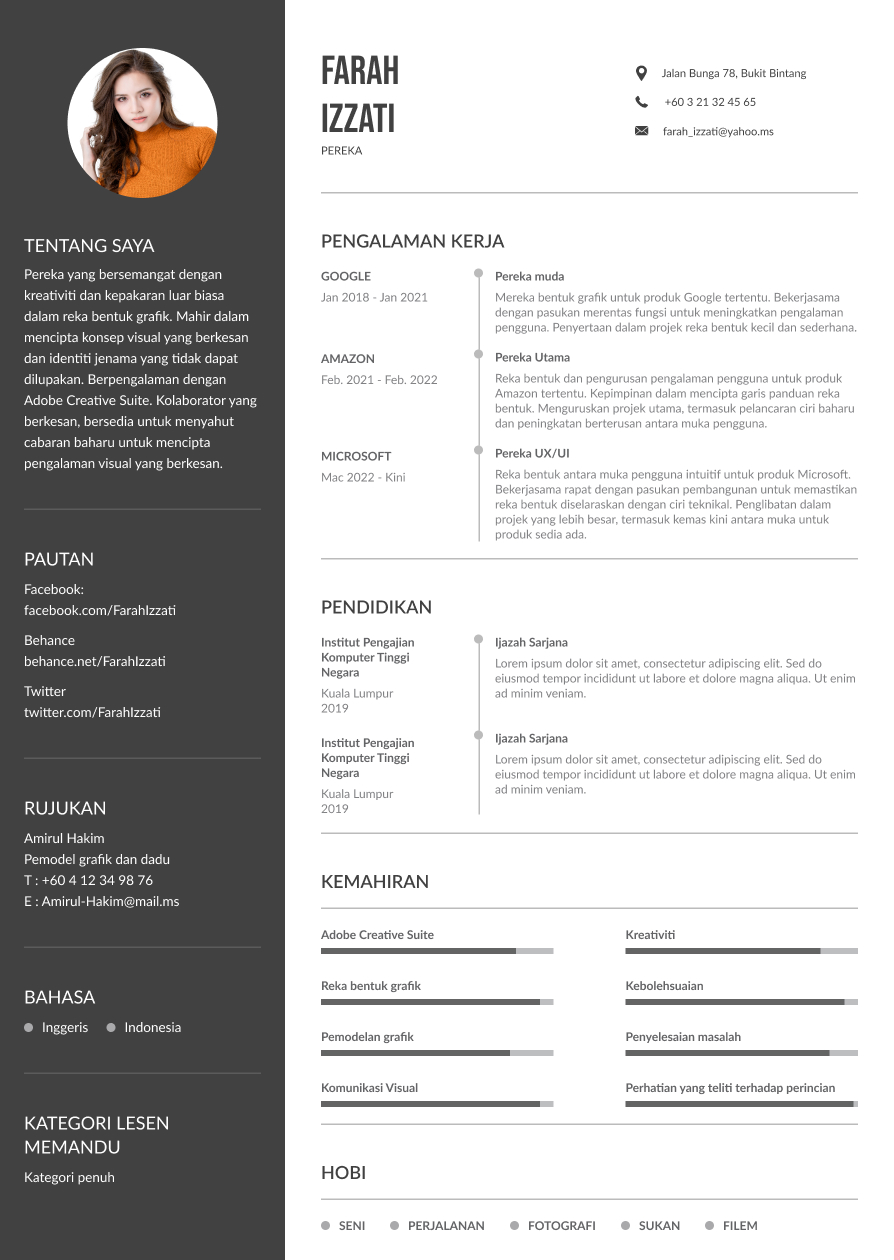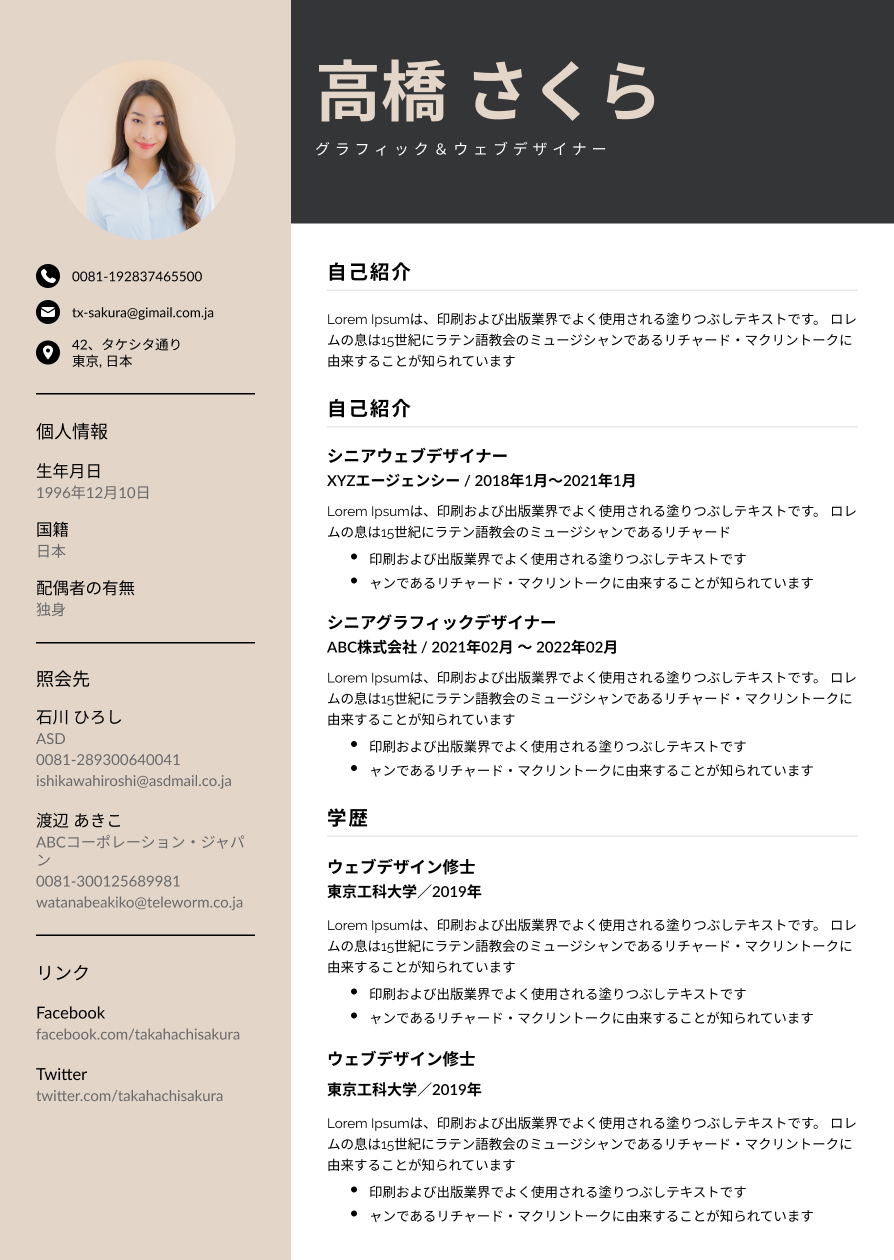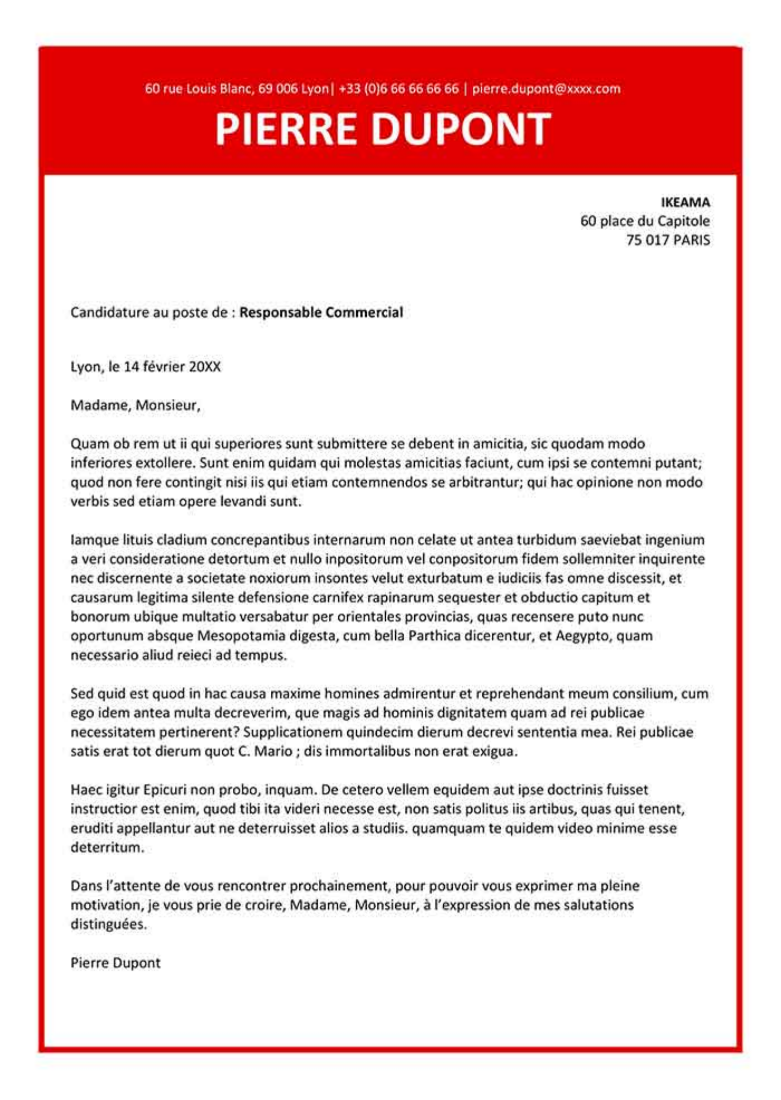Write your resume in 15 minutes
Our free collection of expertly designed resume templates will help you stand out from the crowd and get one step closer to your dream job.


As you might expect, we're going to deliberately include adjectives relevant to your resume – and that will create a lasting impression for the hiring manager of your resume.
Adjectives make your resume memorable – a unique reading experience for the hiring manager.
This comprehensive guide includes everything about adjectives for your resume:
- Where and when to list adjectives on your resume
- Strong resume adjectives to describe your skills
- Most relevant resume adjectives for different professions
- Things you shouldn’t do while using adjectives on your resume
Putting adjectives could be the last step of your resume writing – if your resume is not ready yet, check out our ready-to-fill resume templates where you will find plenty of modern resume templates to build yours from scratch.
Where to List Adjectives on Your Resume?

On a resume, there is no set rule regarding where you should include them – relevant resume adjectives effectively can be inserted in any section. However, the following sections are time-tested in using adjectives to achieve great results.
- Professional summary
- Experience
1. Professional Summary
Summary on a resume highlights the candidate’s overall relevance to the position they’ve applied for. As this is the first statement the hiring manager reads on the resume, this is called the sales pitch.
Most job seekers find it difficult to write their professional summary and some candidates use one summary for all the positions they apply for – making it less effective.
Here is a model for writing your professional summary, regardless of how good your writing skills are:
Two sentences are just the right length for your resume summary. If you practice this framework, you’ll become a pro in writing your summary for each job you apply for – no more boring or repeating summaries – no more hours spent on writing.
In this, notice the adjective that describes the candidate. The one you should use depends on your profession and the skills you want to exhibit to the recruiter.
Consider the following examples:
Example 01: Professional summary for a construction supervisor
A Dedicated
construction supervisor with over 10 years of experience in apartment construction seeks to join Malta Constructions Ltd to take part in their exciting 7-star luxury hotel project. In my previous construction project at Twin Tower, I managed a $30 million worth of labor contracts to successfully conclude the project on time.Example 02: Professional summary for a secretary position
Detail-oriented
secretary with 7 years of experience serving C-level managerial positions at MCP Holdings seeks to join the dynamic administrative team at Dikky & McMillan Law firm. In my previous position, as the secretary to the CEO, managed the calendar, made travel arrangements, and called on behalf of the CEO to free up 30% additional time2. Experience section
This is considered the most important section of any resume – a place where you can demonstrate your expertise and skills.
The experience section should consist of the achievements and accomplishments of the candidate – not just a list extracted from the job description.
Use adjectives appropriately when writing achievements to provide the hiring manager an idea of the depth of your achievements – numbers are used for the same purpose.
Example 01
Example 02
Example 03
You may use multiple adjectives in one sentence – but make sure they are relevant and communicate the right idea.
Numbers are adjectives when used to describe a noun – widely used in the experience section and professional summary section. In addition, numbers add credibility to your statements.

How Adjectives Could Benefit Your Resume?
Powerful resume adjectives could greatly benefit your resume by providing the hiring managers a clear idea about your professional experience and the level of expertise you have in the skills that matter.
Moreover, adjectives are part of good writing – showing the candidate’s writing skills (communication skills) to the recruiter – which is a valuable skill for any profession. The ability to write in an impactful language would be a highly demanding skill.
In addition, adjectives are descriptive words that save precious resume space. In modern resume writing, you have to fit everything on a single side of a paper, which is challenging. Adjectives help you write clearly with less number of words allowing you to utilize resume space efficiently.
Most recruiters nowadays use applicant tracking software to do the initial shortlisting of applications. In this, they feed the system with the relevant keywords that they’re looking for in resumes. Some of these keywords could be adjectives that are relevant to the job. Identifying what adjectives t include on the resume could immensely benefit you.
Best Adjectives to Describe Your Skills Throughout the Resume
You could either write your skills directly on your resume skills section or use the relevant adjectives to showcase them throughout the resume: we suggest the second approach.
There’re hundreds of adjectives in English to describe the most in-demand skills on your resume – some of them demonstrate multiple skills.
Here’s a comprehensive list of skills that employers are looking for on your resume and the relevant adjectives to manifest them.
Use the relevant adjectives naturally on your resume throughout different sections as appropriate.
Adjectives for interpersonal skills
Interpersonal skills refer to the ability of a candidate to communicate and interact well with other people. Most customer-facing jobs, administrative jobs, and general management jobs require candidates with interpersonal skills. Instead of just mentioning interpersonal skills under your skills section, try using some of the following words on your resume naturally.
| Friendly | Welcoming |
| Easy-going | Approachable |
| Mindful | Sensitive |
| Outgoing | Caring |
| Patient | Affectionate |
| Responsive | Sympathetic |
| Sociable | Attentive |
| Receptive | Watchful |
Adjectives for leadership skills
Leadership skills refer to the ability of the candidate to take responsibility for their decisions and work with the big picture in mind.
| Inspiring | Disciplined | Constructive |
| Motivating | Determined | Decisive |
| Honest | Effective | Ideal |
| Influential | Resourceful | Accountable |
| Competent | Productive | Competent |
| Adept | Encouraging | Passionate |
| Bold | Reliable | Visionary |
Adjectives for analytical skills/ critical thinking
Analytical skills refer to the ability of the candidate to analyze information, make decisions, and solve problems based on that.
| Methodical | Perceptive |
| Pragmatic | Thoughtful |
| Shrewd | Practical |
| Insightful | Meticulous |
| Complex | Discerning |
| Intelligent | Logical |
| Strategic | Astute |
Adjectives for management skills
Management skills refer to the candidate’s ability to analyze situations and make decisions. Delegation is also part of management skills – whereas, some skills in the leadership category also fall here.
| Detail-oriented | Fast-learning |
| Dynamic | Efficient |
| Organized | Potent |
| Practical | Effective |
| Compelling | Capable |
| Powerful | Bold |
Adjectives for teamwork
Teamwork refers to the candidate’s ability to work together with multi-cultural, multi-talented individuals and groups to achieve common goals.
| Cooperative | Cheerful |
| Calm | Diplomatic |
| Pleasant | Supportive |
| Persuasive | Team-minded |
| Charming | Positive |
| Clear | Tolerant |
| Respectful | Amiable |
| Thoughtful | Supportive |
| Accepting | Collaborative |
| Courteous | Coherent |
Adjectives for creativity and innovation
This refers to the candidate’s ability to think outside the box and take new approaches to achieve organizational goals. The ability to imagine the outcomes is the first step of both creativity and innovation.
| Fast-learning | Inventive | Unique |
| Progressive | Vivid | Unconventional |
| Unparalleled | Revolutionary | Original |
| Ingenious | Cutting-edge | Groundbreaking |
| World-class
Elegant |
Forward-thinking
Novel |
Unprecedented |
| Imaginative | Robust | |
| First-class | Revolutionary |
Adjectives for communication
Clear communication is a demanding skill for many jobs. Hiring managers assess the candidate’s writing skills in reading the resume & the cover letter and oral communication skills during the interview.
| Clear | Expressive |
| Persuasive | Positive |
| Pleasant | Confident |
| Cohesive | Proactive |
| Assertive | Articulate |
| Personable | Tactful |
| Eloquent | Conscientious |
| Cheerful |
Adjectives for time management

Time management skill refers to the ability of the candidate to accomplish tasks on time – prioritizing what is important the most. Most operational level management and administrative tasks need candidates with efficient time management skills.
| Dynamic | Detail-oriented | Energetic |
| Spirited | Organized | Active |
| Magnetic | Fast learning | Bold |
| Positive | Strong | Organized |
| Orderly | Systematized | Methodical |
| Potent | Perceptive | Powerful |
| Efficient | Coordinated | Effectual |
| Capable | Compelling |
Adjectives for organizational skills
Organizational skills refer to the candidate’s ability to work on different tasks simultaneously managing the time, space, and other factors – especially important for administrative and secretarial functions.
| Methodical | Orderly | Controlled |
| Detail-oriented | Precise | Extensive |
| Analytic | Well planned | Meticulous |
| Comprehensive | Detailed | Accurate |
| Structured | Step-by-step | Timely |
| Systematic | Thorough | Purposeful |
| Painstaking | Scientific |
Adjectives for work ethic
Work ethics refer to the candidate’s attitude towards the job, the work, and the company. Employees with good work ethics predominantly become successful in their careers in any profession.
| Active | Diligent | Enthusiastic |
| Committed | Keen | Driven |
| Devoted | Focused | Confident |
| Persistent | Vigorous | Strong-willed |
| Passionate | Dedicated | Determined |
| Sincere | Wholehearted |
Adjectives to Use for Different Professions
There’re over 100,000 adjectives in English. Your one-page resume consists of around 475-600 words (theladders.com). Adjectives on your resume are like sweeteners – overusing could ruin it all.
Understanding the best adjectives for your requirement and using them naturally would greatly enhance your resume. Here’s more help to pick the right adjectives – based on different professions and job roles.
Adjectives for Administrative jobs: secretary, administrative assistants
| Flexible | Independent | Organized |
| Versatile | Cooperative | Diligent |
| Communicative | Tolerant | Well-mannered |
| Well-served | Easy-going | Accommodating |
| Hard-working | Heedful | Energetic |
| Persistent | Driven | Active |
| Thorough | Adaptive | Attentive |
| Meticulous | Calm | Flexible |
Adjectives for engineers: mechanical, civil, electrical
| Detail-oriented | Determined | Analytical |
| Ingenious | Efficient | Data-driven |
| Purposeful | Committed | Persevering |
| Certified | Focused | Logical |
| Bold | Driven | Logical-minded |
| Precise | Technology-driven | Technology-focused |
| Painstaking | Resourceful | Cooperative |
| Customer-focused |
Adjectives for healthcare jobs: nurses, doctors, physician assistants
| Attentive | Flexible | Careful |
| Compassionate | Empathetic | Mindful |
| Nurturing | Acute | Calm |
| Caring | Watchful | Optimistic |
| Acute | Patient-centered | Heedful |
| Vigilant | Sympathetic | Supportive |
| Focused | Committed | Understanding |
| Preventive | Detail-focused |
Adjectives for customer service jobs: hostess, cashiers, sales executives
| Empathetic | Customer-centered | Adaptable |
| Clever | Astute | Deft |
| Smart | Savvy | Articulate |
| Communicative | Well-spoken | Well-mannered |
| Sympathetic | Reliable | Sensible |
| Optimistic | Positive | Shrewd |
| Intelligent |
Adjectives for creative jobs: graphic designers, photographers
| Creative | Attentive | Dynamic |
| Artistic | Imaginative | Inspired |
| Visionary | Experimental | Innovative |
| Artistic | Expressive | Prolific |
| Passionate | Open-minded | Unconventional |
| Reliable | Curious | Original |
| Communicative | Dependable |
Adjectives for managerial positions: marketing, finance, accounting
| Collaborative | Certified | Committed |
| Dedicated | Detail-oriented | Experienced |
| Service-oriented | Energized | Organized |
| Reliable | Confident | Devoted |
| Strategic | Tactical | Trustworthy |
| Dependable | Qualitative | Quantitative |
| Action-oriented | Perceptive | Adaptable |
| Self-starting |
Adjectives You Shouldn’t be Using on Your Resume
Wrong adjectives could seriously hurt your resume score. Knowing what not to use could save you many regrets.
| Smart | Honest |
| Loyal | Funny |
| Creative | Expert |
| Unemployed | Emotional |
| Inexperienced | Seasoned |
| Hard-working | Knowledgeable |
| Punctual | Professional |

Summary
- Make a list of adjectives you could use on your resume – refer to the lists we have provided – consider the skills you want to showcase and the position you’re applying for
- Create your resume using a modern resume templates from our resume builder – naturally include the adjectives throughout the resume
- Do not use too many adjectives – Do not use irrelevant adjectives – Do not use adjectives that attract negative light of the hiring manager
- Support adjectives with evidence in the form of numbers or statistics
FAQs
How many adjectives should I use on my resume?
There’s no hard and fast rule as to the number of adjectives you should be including on your resume. The right number will depend on the candidate’s profile. However, overusing adjectives could seriously damage the authenticity of your resume. Therefore, use adjectives where necessary.
Action verbs vs Adjectives: what’s the difference?
Adjectives are modifiers often used before nouns to further explain them. In resume writing, adjectives are often used in the professional summary, work history section, and skills section.
Action verbs or power verbs are commonly used in resume writing to present achievements and accomplishments on a resume often in the experience section.
Should I include adjectives on my cover letter?
Yes. Apart from including adjectives on your resume’s professional summary and experience sections, the cover letter is another important document where you should use adjectives. Use the same adjectives you used on your resume or synonyms on the cover letter – make sure you back them up with the relevant proofs.














